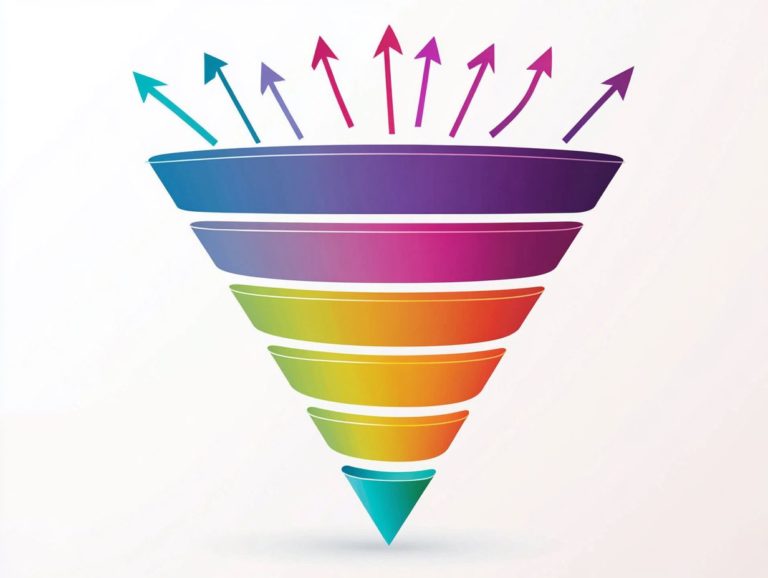What are Lead Scoring Techniques?
Let's Set Up Your Lead Generation Strategy
Fill out the form below, and our team will get in touch with you to create a tailored solution for your business.
In today’s competitive landscape, grasping which leads are most likely to convert is essential for honing your sales and marketing strategies.
Lead scoring offers a systematic approach to evaluate prospects based on various criteria, including lead attributes, enabling you to prioritize your efforts effectively.
Let’s dive into what lead scoring is and why it’s a game-changer! This article examines various techniques—explicit, implicit, behavioral, and demographic—while highlighting its numerous benefits.
You’ll find a step-by-step implementation process and best practices to ensure your lead scoring strategy is both efficient and effective.
Prepare to discover how lead scoring can elevate your approach to sales and marketing!
Contents
- Key Takeaways:
- Understanding Lead Scoring
- Explore the Different Lead Scoring Techniques
- Let's Set Up Your Lead Generation Strategy
- Benefits of Lead Scoring
- Let's Set Up Your Lead Generation Strategy
- Implementing Lead Scoring
- Best Practices for Effective Lead Scoring
- Let's Set Up Your Lead Generation Strategy
- Frequently Asked Questions
Key Takeaways:

- Lead scoring is a method used by businesses to prioritize and rank potential customers based on their level of interest and likelihood to make a purchase.
- There are four key types of lead scoring techniques: explicit, implicit, behavioral, and demographic. Each one looks at different factors to show how valuable a lead is.
- Implementing lead scoring increases efficiency and improves sales and marketing alignment. It is important to follow a step-by-step process and utilize best practices for successful implementation.
Understanding Lead Scoring
Understanding lead scoring is essential for optimizing your sales funnel. This process enables you to prioritize engagement and conversion rates by assessing potential customers based on their likelihood to convert.
With this systematic approach, your sales team can effectively concentrate their efforts on high-quality leads. By leveraging predictive lead scoring, a method that predicts which leads are likely to buy based on data, you gain deeper insights into buyer intent, allowing you to refine your lead generation strategies.
Definition and Purpose
Lead scoring is the systematic process of ranking prospects based on their readiness to purchase. This allows you to focus on leads with the highest conversion potential and improve your sales process.
This methodology not only streamlines your sales efforts but also enhances the efficiency of your sales funnel by providing clear visibility into which leads require immediate attention. By employing specific criteria—like demographic information and engagement levels—you can accurately assess lead quality and prioritize your follow-ups.
Integrating this strategy into your sales process enables you to tailor your approaches, adapting to each lead’s unique needs and readiness. Utilizing a scoring model standardizes your qualification process, ensuring consistent evaluation across the board, ultimately leading to better resource allocation and increased sales success.
Explore the Different Lead Scoring Techniques
You’ll find that various lead scoring techniques, including explicit and implicit scoring, play a crucial role in effectively categorizing leads. By evaluating definable attributes and behaviors, these methods refine your lead generation process, ensuring you focus on the most promising prospects.
Explicit and Implicit Scoring
Explicit scoring involves assigning point values to leads based on identifiable attributes, like company information. Implicit scoring delves into user actions and online behavior to gauge lead interest.
Understanding the distinction between these two methods is essential for optimizing your lead qualification processes. With explicit scoring, you might consider factors like job title or industry, allowing you to pinpoint potential buyers who fit your ideal customer profile. Implicit scoring emphasizes engagement metrics, such as website visits or content downloads, providing valuable insights into a lead’s interest level and intent.
By integrating both approaches, you can cultivate a more nuanced understanding of your leads. This dual strategy enables you to develop tailored marketing efforts that resonate with various buyer personas, ultimately boosting your chances of conversion.
Let's Set Up Your Lead Generation Strategy
Fill out the form below, and our team will get in touch with you to create a tailored solution for your business.
Behavioral and Demographic Scoring

Lead scoring is a method to rate potential customers based on their likelihood to make a purchase. Behavioral scoring evaluates prospects based on their interaction history and engagement metrics. In contrast, demographic scoring looks at leads through predefined criteria such as age, location, and job title.
Integrating these two methodologies into a unified lead scoring system provides a comprehensive understanding of potential customers. Behavioral scoring reveals how engaged a lead is with your brand, highlighting their interests and readiness to make a purchase.
Meanwhile, demographic scoring pinpoints the characteristics that align with your ideal buyer personas. By leveraging both scoring techniques, you can tailor your lead nurturing strategies more effectively.
This powerful combination supercharges your marketing efforts, leading to increased engagement and, ultimately, higher conversion rates. It cultivates stronger relationships with leads, facilitating a smoother transition through the sales funnel.
Benefits of Lead Scoring
Implementing lead scoring offers numerous benefits, particularly in enhancing the alignment between your sales and marketing teams. This ensures resources are utilized effectively to target high-quality leads.
As a result, you increase the number of marketing-qualified leads that evolve into sales-qualified leads. This strategic approach optimizes your efforts and drives greater success in your conversion rates.
Improving Sales and Marketing Alignment
Lead scoring significantly enhances the alignment between your sales and marketing teams. It ensures that both departments adopt a unified approach to defining and identifying quality leads.
When your teams collaborate effectively, they merge insights to refine lead scoring criteria. This ensures criteria accurately reflect customer behavior and preferences.
This synergy fosters a deeper understanding of prospective clients. It allows you to develop tailored messaging and engagement strategies that resonate more powerfully with your target audience.
By leveraging shared analytics, you can identify patterns in lead interactions. This aids in making decisions based on data that optimize the scoring process.
Ultimately, this collaborative effort cultivates a stronger pipeline of leads that are more likely to convert, driving substantial growth for your business.
Efficient Use of Resources
Implementing lead scoring ensures your resources are used efficiently. This allows your team to focus on high-value leads within the pipeline, streamlining the sales process.
This targeted approach boosts the efficiency of your sales team and significantly shortens the sales cycle. By evaluating customer data through engagement levels, demographic information, and behavioral patterns, you prioritize leads with the greatest potential for conversion.
This strategic prioritization enhances your marketing campaigns by directing resources toward nurturing promising leads. As a result, this systematic allocation improves your ROI, aligning your marketing efforts with leads that have shown genuine interest.
Let's Set Up Your Lead Generation Strategy
Fill out the form below, and our team will get in touch with you to create a tailored solution for your business.
Ultimately, this fosters stronger customer relationships and encourages lasting loyalty.
Implementing Lead Scoring
Implementing lead scoring requires a thoughtfully structured approach. Start by defining a scoring model that aligns with your business objectives.
Next, integrate this model with your marketing automation tools to enhance efficiency. Finally, leverage CRM software for effective tracking and management.
This ensures you have a comprehensive view of your leads’ journey.
Step-by-Step Process

The process of implementing lead scoring starts with creating a scoring model based on lead attributes and behaviors.
Next, set up marketing automation tools and CRM software for effective tracking.
This model is essential as it helps you prioritize leads by identifying those most likely to convert into customers. Define specific criteria that encompass demographic factors, engagement levels, and purchasing history.
Monitoring performance is crucial. It ensures your scoring accurately reflects lead quality.
This allows you to make adjustments when necessary. For example, if certain attributes don’t yield the desired results, revising the score weightings can lead to better targeting.
Keep refining your process! This will ensure your lead scoring system stays relevant and boosts your conversion rates.
Best Practices for Effective Lead Scoring
Adopting best practices for effective lead scoring is essential for maximizing the advantages of your scoring model. This alignment ensures that your engagement metrics and lead qualification processes meet your business goals, ultimately driving better results.
Tips for Success
To ensure your success in lead scoring, accurately define lead attributes, continuously refine your scoring model, and employ effective audience targeting strategies.
This approach streamlines your qualification process and enhances the overall efficiency of your marketing efforts.
By incorporating machine learning, which uses data and algorithms to improve predictions over time, you can significantly elevate your predictive scoring capabilities. It identifies patterns within historical data, allowing you to anticipate future behaviors more effectively.
Let's Set Up Your Lead Generation Strategy
Fill out the form below, and our team will get in touch with you to create a tailored solution for your business.
Analyzing customer data—such as engagement levels, demographic information, and purchase history—provides you with invaluable insights.
These insights enable you to adjust your approach, ensuring that your resources focus on leads with the highest likelihood of conversion.
By taking these practical steps, you can create a more refined and effective lead scoring strategy that drives growth and maximizes your return on investment.
Frequently Asked Questions
What are Lead Scoring Techniques?
Lead scoring techniques are methods used by companies to evaluate the potential of a sales lead based on specific criteria.
Why is lead scoring important?

Lead scoring allows businesses to prioritize and focus their efforts on leads that are most likely to convert into customers, saving time and resources.
What factors are typically used in lead scoring?
Common factors include demographics, behavior, and firmographics, such as job title, company size, and industry.
How are lead scoring techniques implemented?
Lead scoring can be implemented manually by sales teams or through automated software that assigns scores based on predefined rules and algorithms.
Are there different types of lead scoring techniques?
Yes, there are several types, including demographic scoring, behavioral scoring, and predictive scoring.
Can lead scoring be customized for different businesses?
Yes, lead scoring techniques can be tailored to fit the unique needs and goals of different businesses, allowing for a more personalized approach to lead management.
Ready to implement your own lead scoring strategy? Reach out today for more information!






